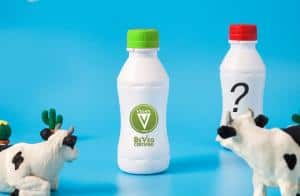If you’re trying to avoid dairy, it is important to know the difference between these similar but very different label claims.
PALM BEACH, FLORIDA, UNITED STATES, May 13, 2022 /EINPresswire.com/ — It would seem that dairy-free and non-dairy mean the same thing, right? To the lay consumer who does not understand the technical differences it would seem safe to assume these label claims mean they “do not contain dairy.” Despite the fact that these claims are often used interchangeably, they do not mean the same thing and are often misleading as they remain largely unregulated by the Food and Drug Administration (FDA) and European Union (EU).
Dairy-Free
This label claim means it is free from dairy and dairy derivatives like milk, cheese, yogurt, sour cream, casein, lactose and other dairy allergens. Since 20% of the world is lactose intolerant and 100% of the Asian population is lactose intolerant, to the allergen sufferer the credibility of this claim is critical, especially when there’s no legitimate Vegan certification trademark on the product label packaging. If you see a Vegan Trademark, like BeVeg, or kosher parve, it clears all confusion because that means the product is in fact “dairy-free”, “non-dairy” and “plant-based.” To date, there is no definition by the FDA for “dairy-free” claims.
Non-Dairy
This label claim is regulated by the FDA, but the claim itself is misleading to consumers as “non-dairy” claims allow for the presence of milk protein, and may in fact contain some form of dairy, whey or lactose. Most notably, casein is often used in “non-dairy” and “plant-based” products. This is very misleading but since existing laws allow manufacturers and brand owners to round down to zero when an ingredient used is less than .5grams per serving, this allows for label claims to be very misleading to consumers. Non-dairy is more aligned with a “plant-based” label claim but cannot be used interchangeably with a Vegan label claim.
Since casein is a milk allergen and dairy derivative, the FDA requires it to be explicitly labeled in the tiny print in parenthesis as “(a milk derivative),” and also include phrasing like “may contain milk” below the list of ingredients. This leaves the super consumer and interested consumer trusting misleading label claims on the front of packaging like “non-dairy” and not realizing they also need to read the fine print to know that there may in fact be some dairy presence. Non-dairy labels are used when 0.5% or less of the final product contains milk in the form of casein or caseinates.
Bottom Line: "non-dairy" and "dairy-free" labels are not the same.
This is not a “MOO” point. Pun intended!
“Dairy-free”, “non-dairy”, “plant-based” and “Vegan” are voluntary label claims, as the FDA has no meaningful regulation for these meaningful marketing claims. While consumer protection laws are supposed to protect the consumer from misleading labeling and assist the consumer in making informed purchasing decisions, that is not the case while these labels remain largely unregulated – allowing for fraudulent and misleading label remarks by brands for increased sales. This is important for the Vegan consumer, flexitarian and allergen sufferer because while the amounts of dairy detected may be small in the final product, that can still be significant to the consumer, especially sensitive allergic consumers.
In summary, with either label, just looking at the label would not be sufficient because sadly, these label claims are used interchangeably daily and lack clear meaning to the consumer.
To be sure, look for the Vegan Certification global trademark by BeVeg, as that is the world’s only ISO accredited Vegan symbol that takes into consideration animal contamination and precautions at the manufacturing level to help products truly make a free-from animal contamination dairy-free claim, rather than a wishy-washy non-dairy, plant-based claim. There is a huge difference.
To apply for the official and global Vegan logo, check out www.beveg.com.
Carissa Kranz
BeVeg International
+1 202-996-7999
email us here
Visit us on social media:
Facebook
Twitter
LinkedIn
